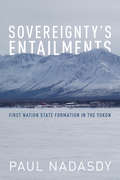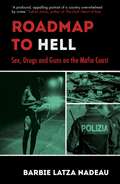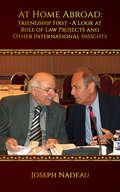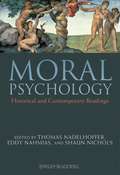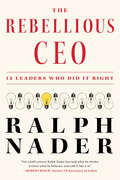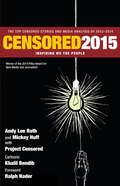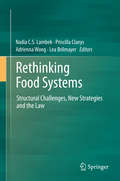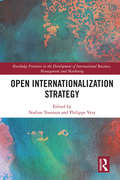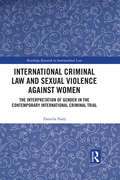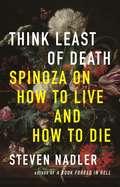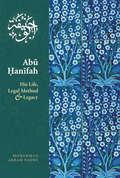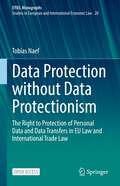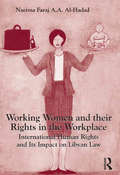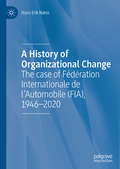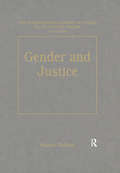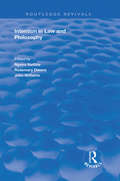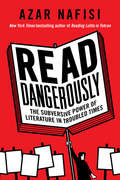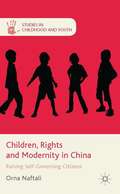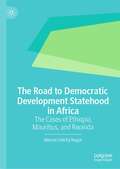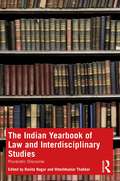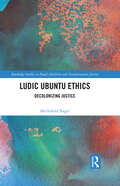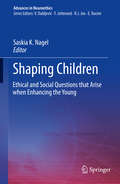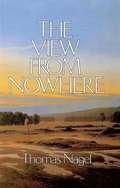- Table View
- List View
Sovereignty's Entailments: First Nation State Formation in the Yukon
by Paul NadasdyIn recent decades, indigenous peoples in the Yukon have signed land claim and self-government agreements that spell out the nature of government-to-government relations and grant individual First Nations significant, albeit limited, powers of governance over their peoples, lands, and resources. Those agreements, however, are predicated on the assumption that if First Nations are to qualify as governments at all, they must be fundamentally state-like, and they frame First Nation powers in the culturally contingent idiom of sovereignty. Based on over five years of ethnographic research [carried out] in the southwest Yukon, Sovereignty’s Entailments is a close ethnographic analysis of everyday practices of state formation in a society whose members do not take for granted the cultural entailments of sovereignty. This approach enables Nadasdy to illustrate the full scope and magnitude of the "cultural revolution" that is state formation and expose the culturally specific assumptions about space, time, and sociality that lie at the heart of sovereign politics. Nadasdy’s timely and insightful work illuminates how the process of state formation is transforming Yukon Indian people’s relationships with one another, animals, and the land.
Roadmap to Hell: Sex, Drugs and Guns on the Mafia Coast
by Barbie Latza NadeauFrom sex slaves to drug mules, The Daily Beast's Rome Bureau Chief uncovers a terrifying and intricate web of criminal activity right on Europe&’s doorstep. Chasing the money from kidnapped Nigerian hair braiders to ISIS gunrunners, this is the story of modern slavery in Europe and how the plight of those most in need is being wilfully disregarded. Caught between Camorra arms dealers and Nigerian drug gangs along Italy&’s attractive coast, each year thousands of refugees and migrants are lured into their murky underworld. In this powerful exposé, investigative journalist Barbie Latza Nadeau follows the weapons trail, meets the sex-trafficked women trapped by black magic, the nuns who try to save them and the Italian police who turn a blind eye as the most urgent issues facing Europe play out in broad daylight.
At Home Abroad: A Look at Rule of Law Projects and Other International Insights
by Joseph NadeauThe authors of this book - judges, lawyers, educators, researchers, and administrators - provide personal insights into international cooperative efforts to promote the rule of law in emerging democracies throughout the world. The progress made and the challenges ahead are described with equal doses of idealism and reality. It has been said of many reform efforts that they are not for the faint of heart. Readers will soon discover that the authors of this book are of stout heart. With more than one hundred and fifty years of combined experience, the writers' accounts serve as a roadmap for those who wish to follow in their footsteps and will truly help them to feel at home abroad.
Moral Psychology: Historical and Contemporary Readings
by Thomas Nadelhoffer Eddy Nahmias Shaun NicholsMoral Psychology: Historical and Contemporary Readings is the first book to bring together the most significant contemporary and historical works on the topic from both philosophy and psychology. Provides a comprehensive introduction to moral psychology, which is the study of psychological mechanisms and processes underlying ethics and morality. Unique in bringing together contemporary texts by philosophers, psychologists and other cognitive scientists with foundational works from both philosophy and psychology. Approaches moral psychology from an empirically informed perspective. Explores a wide range of topics from passion and altruism to virtue and responsibility. Editorial introductions to each section explain the background of and connections between the selections.
The Rebellious CEO: 12 Leaders Who Did It Right
by Ralph NaderOne of corporate America's greatest foes shows how 12 CEOs he has known uniquely rejected narrow yardsticks of shareholder value by leading companies to larger models of prosperity and justiceOver the course of 7 decades Ralph Nader has been Corporate America&’s fiercest critic. Supreme Court Justice William Powell singled out Nader in his infamous memo as the &“single most effective antagonist of American business… [the] target of his hatred… is corporate power.&”But now, in a book that will surprise both his fans and critics, Nader profiles a small group of CEOs who he believes performed extraordinarily well as business leaders and civic reformers, some well-known, some not, who should be celebrated as exceptions whose life and career should be a course of emulation and inspiration for students of business, executives and the wider citizenry. This select group of mavericks and iconoclasts — which includes The Body Shop&’s Anita Roddick, Patagonia&’s Yvon Chouinard, Vanguard&’s John Bogle and Busboys and Poets' Andy Shallal —give us, Nader writes, &“a sense of what might have been and what still could be if business were rigorously framed as a process that was not only about making money and selling things but improving our social and natural world.&”
Censored 2015
by Ralph Nader Khalil Bendib Project Censored Mickey Huff Andy Lee RothEvery year since 1976, Project Censored, our nation's oldest news-monitoring group--a university-wide project at Sonoma State University founded by Carl Jensen, directed for many years by Peter Phillips, and now under the leadership of Mickey Huff--has produced a Top-25 list of underreported news stories and a book, Censored, dedicated to the stories that ought to be top features on the nightly news, but that are missing because of media bias and self-censorship.A perennial favorite of booksellers, teachers, and readers everywhere, Censored is one of the strongest life-signs of our current collective desire to get the news we citizens need--despite what Big Media tells us.From the Trade Paperback edition.x havens. . . . And so much more that didn't make the front page (or even back page). Informative and timely, appalling and sometimes uplifting, Censored alerts readers to the stories that were quashed in favor of media bias, celebrity scandals, and self-censorship, in hopes that we the people, armed with knowledge, put our bodies upon the gears--before it's too late.From the Trade Paperback edition.
Rethinking Food Systems
by Nadia C.S. Lambek Priscilla Claeys Adrienna Wong Lea BrilmayerTaking as a starting point that hunger results from social exclusion and distributional inequities and that lasting, sustainable and just solutions are to be found in changing the structures that underlie our food systems, this book examines how law shapes global food systems and their ongoing transformations. Using detailed case studies, historical mapping and legal analysis, the contributors show how various actors (farmers, civil society groups, government officials, international bodies) use or could use different legal tools (legislative, jurisprudential, norm-setting) on various scales (local, national, regional, global) to achieve structural changes in food systems. Section 1, Institutionalizing New Approaches, explores the possibility of institutionalizing social change through two alternative visions for change - the right to food and food sovereignty. Individual chapters discuss Vía Campesina's struggle to implement food sovereignty principles into international trade law, and present case studies on adopting food sovereignty legislation in Nicaragua and right to food legislation in Uganda. The chapters in Section 2, Regulating for Change, explore the extent to which the regulation of actors can or cannot change incentives and produce transformative results in food systems. They look at the role of the state in regulating its own actions as well as the actions of third parties and analyze various means of regulating land grabs. The final section, Governing for Better Food Systems, discusses the fragmentation of international law and the impacts of this fragmentation on the realization of human rights. These chapters trace the underpinnings of the current global food system, explore the challenges of competing regimes of intellectual property, farmers rights and human rights, and suggest new modes of governance for global and local food systems. The stakes for building better food systems are high. Our current path leaves many behind, destroying the environment and entrenching inequality and systemic poverty. While it is commonly understood that legal structures are at the heart of food systems, the legal academy has yet to make a significant contribution to recent discussions on improving food systems - this book aims to fill that gap.
Open Internationalization Strategy (Routledge Frontiers in the Development of International Business, Management and Marketing)
by Nadine Tournois; Philippe VeryOpen internationalization is a concept that brings a new perspective on the process of firm internationalization. As theories of internationalization show, some companies expand abroad only on their own, known as closed internationalization, while others combine their resources with those of other firms or use their networks for facilitating foreign implantation, known as open internationalization. Parallel to the development of the well-known concept of open innovation, open internationalization can be conceived as a meta-model for understanding companies’ expansion abroad. This book gathers a selection of contemporary research works dedicated to open internationalization, either seen as a way to analyze expansion in foreign countries, or as a way to investigate the management of geographically dispersed activities. All the authors of the chapters are researchers specialized in the internationalization field. Readers will benefit from this new lens for understanding, studying or practising international business, from the decision to go abroad to its implementation and its efficiency. Open Internationalization Strategy includes both academic empirical investigations and literature reviews on specific topics, making it valuable to researchers, academics, managers, and students in the fields of business and management history, international business, organizational studies, and economics.
International Criminal Law and Sexual Violence against Women: The Interpretation of Gender in the Contemporary International Criminal Trial (Routledge Research in International Law)
by Daniela NadjThis book explores the prosecution of wartime sexual violence in international criminal law and asks what the juridicalisation of gender-based violence signifies for women. The book explores the portrayal of the various gendered identities that surface in armed conflict and it asks whether the law is capable of reflecting these in subsequent judgements. Focusing on the International Criminal Tribunal for the Former Yugoslavia and the International Criminal Tribunal for Rwanda as well as subsequent developments in the International Criminal Court, the book shows how the tribunals have delivered landmark jurisprudence in the area of sexual violence against women and provided a legacy for how gender justice is incorporated into international law. However, Daniela Nadj argues that in the relevant cases there is a tendency to depict women in monolithic fashion with little agency or sense of identity beyond their ethnicity. By bringing to the surface the complexity and multi-faceted gendered identities in wartime, the book calls for a reconceptualisation of notions of femininity in armed conflict.
Think Least of Death: Spinoza on How to Live and How to Die
by Steven NadlerFrom Pulitzer Prize-finalist Steven Nadler, an engaging guide to what Spinoza can teach us about life’s big questionsIn 1656, after being excommunicated from Amsterdam’s Portuguese-Jewish community for “abominable heresies” and “monstrous deeds,” the young Baruch Spinoza abandoned his family’s import business to dedicate his life to philosophy. He quickly became notorious across Europe for his views on God, the Bible, and miracles, as well as for his uncompromising defense of free thought. Yet the radicalism of Spinoza’s views has long obscured that his primary reason for turning to philosophy was to answer one of humanity’s most urgent questions: How can we lead a good life and enjoy happiness in a world without a providential God? In Think Least of Death, Pulitzer Prize–finalist Steven Nadler connects Spinoza’s ideas with his life and times to offer a compelling account of how the philosopher can provide a guide to living one’s best life.In the Ethics, Spinoza presents his vision of the ideal human being, the “free person” who, motivated by reason, lives a life of joy devoted to what is most important—improving oneself and others. Untroubled by passions such as hate, greed, and envy, free people treat others with benevolence, justice, and charity. Focusing on the rewards of goodness, they enjoy the pleasures of this world, but in moderation. “The free person thinks least of all of death,” Spinoza writes, “and his wisdom is a meditation not on death but on life."An unmatched introduction to Spinoza’s moral philosophy, Think Least of Death shows how his ideas still provide valuable insights about how to live today.
Abu Hanifah
by Mohammed Akram NadwiAbu Hanifah Nu'man ibn Thabit was one of the greatest pioneers in the history of Islamic Law, particularly in legal reasoning. The Hanafi Legal School that he founded has become the most widely followed among the world's Muslims. Based on primary sources, this study of the life and legacy of Abu Hanifah also surveys the evolution of Hanafi legal reasoning (fiqh) in different regions of the Islamic world and assesses its historical distinctiveness.Mohammed Akram Nadwi is a research fellow at the Oxford Centre for Islamic Studies, and is the author of several works including al-Muhaddithat: the Women Scholars in Islam (2007).
Data Protection without Data Protectionism: The Right to Protection of Personal Data and Data Transfers in EU Law and International Trade Law (European Yearbook of International Economic Law #28)
by Tobias NaefThis open access book offers a new account on the legal conflict between privacy and trade in the digital sphere. It develops a fundamental rights theory with a new right to continuous protection of personal data and explores the room for the application of this new right in trade law. Replicable legal analysis and practical solutions show the way to deal with cross-border data flows without violating fundamental rights and trade law principles. The interplay of privacy and trade became a topic of worldwide attention in the wake of Edward Snowden’s revelations concerning US mass surveillance. Based on claims brought forward by the activist Maximilian Schrems, the ECJ passed down two high-profile rulings restricting EU-US data flows. Personal data is relevant for a wide range of services that are supplied across borders and restrictions on data flows therefore have an impact on the trade with such services. After the two rulings by the ECJ, it is less clear then ever how privacy protection and trade can be brought together on an international scale. Although it was widely understood that the legal dispute over EU-US data flows concerns the broad application of EU data protection law, it has never been fully explored just how far the EU’s requirements for the protection of digital rights go and what this means beyond EU-US data flows. This book shows how the international effects of EU data protection law are rooted in the EU Charter of Fundamental Rights and that the architecture of EU law demands that the Charter as primary EU law takes precedence over international law. The book sets out to solve the problem of how the EU legal data transfer regime must be designed to implement the EU’s extraterritorial fundamental rights requirements without violating the principles of the WTO’s law on services. It also addresses current developments in international trade law – the conclusion of comprehensive trade agreements – and offers suggestion for the design of data flow clauses that accommodate privacy and trade.
Working Women and their Rights in the Workplace: International Human Rights and Its Impact on Libyan Law
by Naeima Faraj Al-HadadThis book addresses women’s rights to work and motherhood in Libya from a legal and international human rights perspective. In an attempt to solve the problem posed by the perception that there is an unsolvable conflict between the right of women to work and their right to motherhood, the author considers how these two sets of rights, as protected under international human rights law, can and should be recognised and promoted within the Libyan legal system. Including first-hand accounts of experiences of Libyan women, the study voices their struggle for their rights as guaranteed by domestic law, international conventions and Islam. Providing a rare insight into a region striving to find its new identity, the author assesses the adequacy of existing Libyan laws and, where warranted, offers proposals for legislative amendments to Libyan policy makers and its new Parliament at such a crucial time in the nation’s history.
A History of Organizational Change: The case of Fédération Internationale de l’Automobile (FIA), 1946–2020
by Hans Erik NæssThis book is the first independent exploration of the Fédération Internationale de l’Automobile’s (FIA) institutional history. Virtually unexamined compared with similar institutions like the FIFA and the IOC, the FIA has nevertheless changed from being a small association in 1904 to becoming one of the world’s most influential sport governing bodies. Through chronologically organised chapters, this book explains how the FIA manages to link together motorsport circuses like Formula 1 with the automotive industry and societal issues like road safety and environmental sustainability. In an exciting narrative spanning seven decades, it reviews the FIA’s organisational turning points, governing controversies, political dramas and sporting tragedies. Considering the FIA to be a unique type of hybrid organisation characterised by what the author calls ‘organisational emulsion’, this case study contains theoretical innovations relevant to other studies of sport governing bodies. It makes an empirically grounded contribution to the research fields of institutional logics, historical sociology and sport governance.
Gender and Justice (The\international Library Of Essays In Law And Legal Theory (second Series) Ser. #2)
by Ngaire NaffineThe leading articles on gender and justice within Anglo-American legal theory are assembled in this volume. The essays are drawn primarily from the writings of lawyers working in the common law tradition and they mainly examine the justice of legal institutions. Due to the close kinship between political and legal theories of justice, the book also includes a selection of the work of the more prominent political theorists of justice and gender.
Intention in Law and Philosophy (Routledge Revivals)
by Ngaire Naffine Rosemary OwensThis title was first published in 2001. Legal systems are posited on the assumption that people are rational intentional agents who can choose to follow or break the law. This book connects the common interests of lawyers and philosophers in the meaning of intention and its relation to responsibility in legal, moral and political contexts.
Read Dangerously: The Subversive Power of Literature in Troubled Times
by Azar NafisiThe New York Times bestselling author of Reading Lolita in Tehran returns with a guide to the power of literature in turbulent times, arming readers with a resistance reading list, ranging from James Baldwin to Zora Neale Hurston to Margaret Atwood."[A] stunning look at the power of reading. ... Provokes and inspires at every turn." —Publishers Weekly (starred review)"Remarkable. ... Audacious." —The ProgressiveWhat is the role of literature in an era when one political party wages continual war on writers and the press? What is the connection between political strife in our daily lives, and the way we meet our enemies on the page in fiction? How can literature, through its free exchange, affect politics?In this galvanizing guide to literature as resistance, Nafisi seeks to answer these questions. Drawing on her experiences as a woman and voracious reader living in the Islamic Republic of Iran, her life as an immigrant in the United States, and her role as literature professor in both countries, she crafts an argument for why, in a genuine democracy, we must engage with the enemy, and how literature can be a vehicle for doing so.Structured as a series of letters to her father, who taught her as a child about how literature can rescue us in times of trauma, Nafisi explores the most probing questions of our time through the works of Toni Morrison, Salman Rushdie, James Baldwin, Margaret Atwood, and more.
Children, Rights and Modernity in China
by Orna NaftaliThis book is an original, ethnographic study of the emergence of a new type of thinking about children and their rights in urban China. It brings together evidence from a variety of Chinese government, academic, pedagogic and media publications, and from interviews and participant observations conducted in schools and homes in Shanghai, China.
The Road to Democratic Development Statehood in Africa: The Cases of Ethiopia, Mauritius, and Rwanda
by Marcel Felicity NagarThis book interrogates Africa’s pursuit of the Democratic Developmental State model by drawing on the experiences of Mauritius, Ethiopia, and Rwanda. It comprises of five parts: Part I, consisting of two chapters, outlines the key conceptual and theoretical approaches used throughout the book’s discussions. The proceeding parts II, III and IV critically analyses the three case studies under review. Each part is subdivided into two chapters wherein a historical state-societal approach is employed in interrogating the extent to which Mauritius, Ethiopia, and Rwanda have been able to successfully achieve democratic development, on the one hand, and, conversely, inclusive economic growth and development, on the other. Part V, and Chapter 10 debuts the concept and model of the Developmental Civil Society.
The Indian Yearbook of Law and Interdisciplinary Studies: Pluralistic Discourse
by Ranita Nagar Hiteshkumar ThakkarThis yearbook focuses on law and its interdisciplinarity in India. It brings together scholars of law, economics, and policy to foster multidisciplinary thinking and analysis across subject areas. The contributors to this volume embody an interdisciplinary spirit through their academic experience and aim to bring to the fore unique suggestions for a better understanding of the law. The volume explores various key issues that are central to state policy demanded by a functioning democracy, in terms of democratic quality, aspirations and sustainability. It discusses global and social issues, such as foreign interference in domestic elections, feminism, and climate change and looks at other subjects such as economics, religion, history, literature from the perspective of law. A unique contribution to the study of law in India, this book will be an essential read for scholars and researchers of law, jurisprudence, political science, economics, public policy, sociology, social anthropology, the Indian Constitution, and South Asia studies.
Ludic Ubuntu Ethics: Decolonizing Justice (Routledge Studies in Penal Abolition and Transformative Justice)
by Mechthild NagelLudic Ubuntu Ethics develops a positive peace vision, taking a bold look at African and Indigenous justice practices and proposes new relational justice models. ‘Ubuntu’ signifies shared humanity, presenting us a sociocentric perspective of life that is immensely helpful in rethinking the relation of offender and victim. In this book, Nagel introduces a new theoretical liberation model—ludic Ubuntu ethics—to showcase five different justice conceptions through a psychosocial lens, allowing for a contrasting analysis of negative Ubuntu (eg., through shaming and separation) towards positive Ubuntu (eg., mediation, healing circles, and practices that no longer rely on punishment). Providing a novel perspective on penal abolitionism, the volume draws on precolonial (pre-carceral) Indigenous justice perspectives and Black feminism, using discourse analysis and a constructivist approach to justice theory. Nagel also introduces readers to a post secular turn by taking seriously the spiritual dimensions of healing from harm and highlighting the community’s response. Spanning disciplinary boundaries and aimed at readers seeking to understand how to move beyond reintegrative shaming and restorative justice theories, the volume will engage scholars of criminology, philosophy and law, and more specifically penal abolitionism, social ethics, peace studies, African studies, critical legal studies, and human rights. It will also be of great interest to practitioners and activists in restorative justice, mediation, social work, and performance studies.
Unrestrained: Judicial Excess and the Mind of the American Lawyer
by Robert F. NagelRobert Nagel's innovative volume attempts to explain why, despite almost four decades of conservative and moderate appointments, the Supreme Court continues to intervene aggressively in a wide array of social and political issues. The explanation lies primarily in the psychological effects of the way that lawyers think about law and judging. The instincts ingrained by the experiences common to legal education and the successful practice of law also work to encourage the reckless use of power.Nagel argues that the problem with the modern judicial role is cultural and political. He demonstrates that judges, especially Supreme Court justices, have degraded our political discourse, intensified social conflict, and drained moral confidence.By examining modern Supreme Court confirmation hearings along with certain classic legal writings, Nagel shows how modern lawyers have a broad consensus on how to interpret the Constitution and, more generally, how to think about law. One major component of this mindset is to combine realism with legalism in ways that naturally tend to expand the judiciary's imperial role. Realism counsels that decisions are inevitably partly personal and therefore cannot be conclusively justified while legalism imparts the sense that the judge's interpretation is the best one possible. This combination of the personal and political, along with other aspects of modem legal thinking and training, means that judges are not only unconstrained by professional norms but actually are impelled by them to use power expansively.This issue is important to every person living in the U.S., as the Supreme Court's decisions concern everyone in the nation. It has the potential to be read by lawmakers, lawyers, students of law and political science, and anyone interested in Constitutional law. The thesis is unique and the execution is precise.
Shaping Children: Ethical and Social Questions that Arise when Enhancing the Young (Advances in Neuroethics)
by Saskia K. NagelThe volume offers a unique collection of articles on pediatric neuroenhancement from an international and multidisciplinary perspective. In recent years, the topic of “neuroenhancement” has become increasingly relevant in academia and practice, as well as among the public. While autonomous adults are free to choose neuroenhancement, in children it presents its own ethical, social, legal, and developmental issues. A plethora of potential (neurotechnological) enhancement agents are on the market. While the manifold issues surrounding the topic have been extensively discussed, there is little work on the specific questions that arise in children and adolescents. This book addresses this gap in the literature: Next to conceptual and normative work on autonomy and self-control, the collection explores the implications for parenting and schooling, and provides input for a discussion of public attitudes. It is a valuable resource for the different academic communities confronted with questions of how to evaluate and approach enhancement in children and is of interest to neuroethicists, scholars in applied ethics and neurology, psychiatrists and psychologists as well as scientists developing enhancement interventions for children.
Mortal Questions
by Thomas NagelThomas Nagel's Mortal Questions explores some fundamental issues concerning the meaning, nature and value of human life. Questions about our attitudes to death, sexual behaviour, social inequality, war and political power are shown to lead to more obviously philosophical problems about personal identity, consciousness, freedom, and value. This original and illuminating book aims at a form of understanding that is both theoretical and personal in its lively engagement with what are literally issues of life and death.
The View From Nowhere
by Thomas NagelHuman beings have the unique ability to view the world in a detached way: We can think about the world in terms that transcend our own experience or interest, and consider the world from a vantage point that is, in Nagel's words, "nowhere in particular". At the same time, each of us is aparticular person in a particular place, each with his own "personal" view of the world, a view that we can recognize as just one aspect of the whole. How do we reconcile these two standpoints--intellectually, morally, and practically? To what extent are they irreconcilable and to what extent canthey be integrated? Thomas Nagel's ambitious and lively book tackles this fundamental issue, arguing that our divided nature is the root of a whole range of philosophical problems, touching, as it does, every aspect of human life. He deals with its manifestations in such fields of philosophy as:the mind-body problem, personal identity, knowledge and skepticism, thought and reality, free will, ethics, the relation between moral and other values, the meaning of life, and death. Excessive objectification has been a malady of recent analytic philosophy, claims Nagel, it has led to implausibleforms of reductionism in the philosophy of mind and elsewhere. The solution is not to inhibit the objectifying impulse, but to insist that it learn to live alongside the internal perspectives that cannot be either discarded or objectified. Reconciliation between the two standpoints, in the end, isnot always possible.
